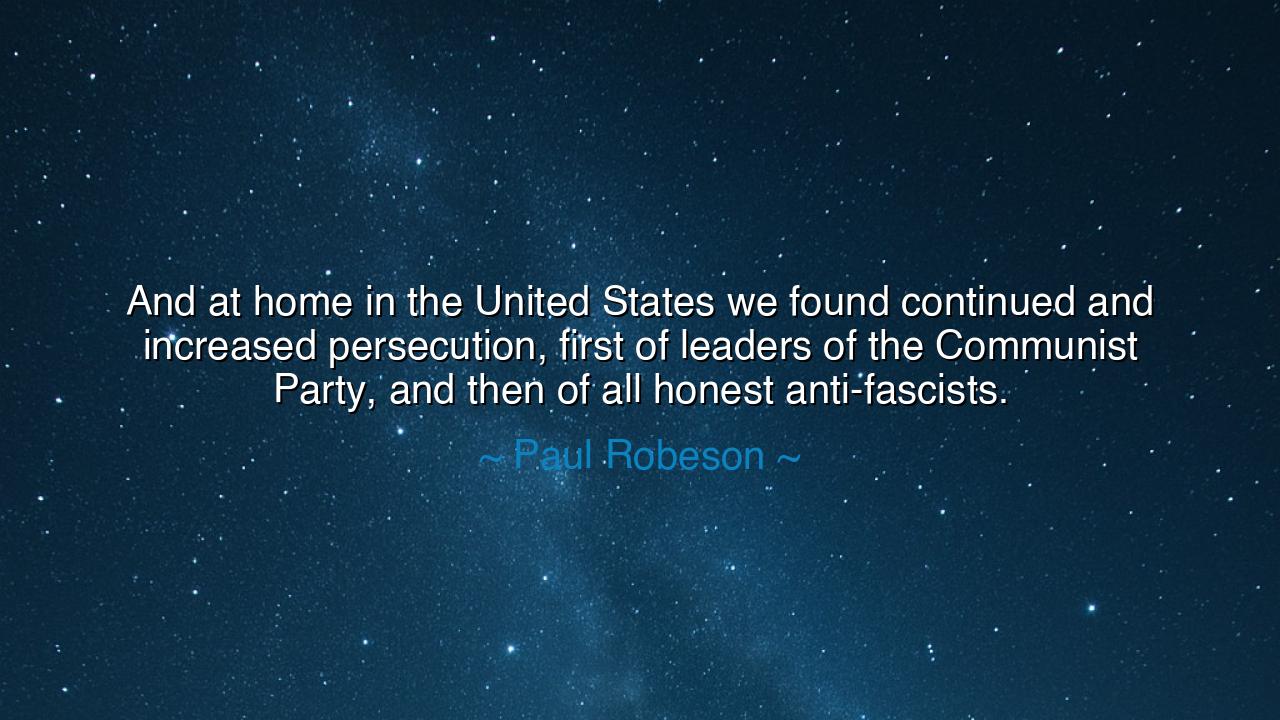
And at home in the United States we found continued and increased
And at home in the United States we found continued and increased persecution, first of leaders of the Communist Party, and then of all honest anti-fascists.






In the stern cadence of a witness, a singer-statesman declares: “And at home in the United States we found continued and increased persecution, first of leaders of the Communist Party, and then of all honest anti-fascists.” Hear the lament’s double turning. He names a narrowing made wide: repression that began with a targeted few but grew to cast its shadow over many who stood against tyranny in any uniform. The sentence is a bell tolling for a nation that praised liberty in its hymns while tightening iron around dissenting throats.
To weigh the meaning of these words, imagine the sequence as a funnel. At first, the state hunts the conspicuous quarry—leaders of the Communist Party—charging them under new and old devices: loyalty oaths, blacklists, prosecutions that made opinion into contraband. But fear, once appointed captain, does not stop at the harbor. It sails farther, claiming the sea itself. Soon the net drags wider waters: editors, teachers, unionists, artists—“all honest anti-fascists”—any who insisted that opposing Hitler and Franco abroad required opposing racism and repression at home as well. Thus, what begins as a political purge matures into a cultural silencing.
The origin of the quote is the furnace of the second Red Scare, when committees summoned citizens and the air smelled of paper ash—names burned from payrolls, ideas from classrooms. Paul Robeson, who had sung for workers and soldiers against fascism, felt the circle close: concerts canceled, the passport seized, the door between him and the world locked by the very republic he had lauded in song. The paradox was acid: to lift one’s voice against tyrannies overseas was to invite suspicion on Main Street; to demand full citizenship for the least was to be branded un-American in the United States.
Remember a scene like a storm-front splitting the hills—the Peekskill concerts of 1949. A gathering meant for music and solidarity met stones and fists; windows shattered; the road out became a gauntlet of hatred. There the mask fell: not only leaders of the Communist Party were menaced, but veterans, families, neighbors—any who stood shoulder to shoulder with a black baritone and his creed that dignity knows no border. The riot was not an aberration but a mirror: it reflected how quickly fear deputizes the ordinary to do its extraordinary work.
And still the witness speaks of “honest anti-fascists,” for honesty is the dividing line. An honest adversary names what he opposes and why; an honest citizen asks the state to live up to its own charter. That such honesty drew persecution shows how fragile freedom can be when myths are worshiped more than laws, and when unity is demanded as a price rather than offered as a gift. The quote is thus a warning to descendants: beware the season when the vocabulary of safety is used to starve the grammar of rights.
What, then, is the teaching? First, that liberties die by increments: today’s exception becomes tomorrow’s rule. Second, that categories used to isolate a few—“radical,” “foreign,” “agitator”—soon expand to ensnare the necessary many—the ones who keep the republic argumentative and, therefore, alive. Third, that patriotism without courage becomes pageantry; courage without solidarity becomes martyrdom. We must braid them: love of country that dares to correct it, love of neighbor that dares to be seen beside them when lists are made.
Carry out practical rites worthy of the warning. (1) When fear swells the public square, demand particulars: charges, evidence, due process—no penalties by rumor. (2) Protect the unpopular speaker as you would the beloved one; today’s shield for them is tomorrow’s shelter for you. (3) Tie anti-fascism abroad to anti-authoritarian practice at home: oppose torture, mass surveillance without warrant, and the quiet erasure of classrooms into propaganda halls. (4) Join hands across lines of party and creed to defend unions, the press, artists, and the vote; make a chorus too broad to blacklist and too resolute to intimidate. Do these, and the lament will become a lamp: a remembrance of winter that teaches us how to keep spring.






AAdministratorAdministrator
Welcome, honored guests. Please leave a comment, we will respond soon